 Petzlover
Petzlover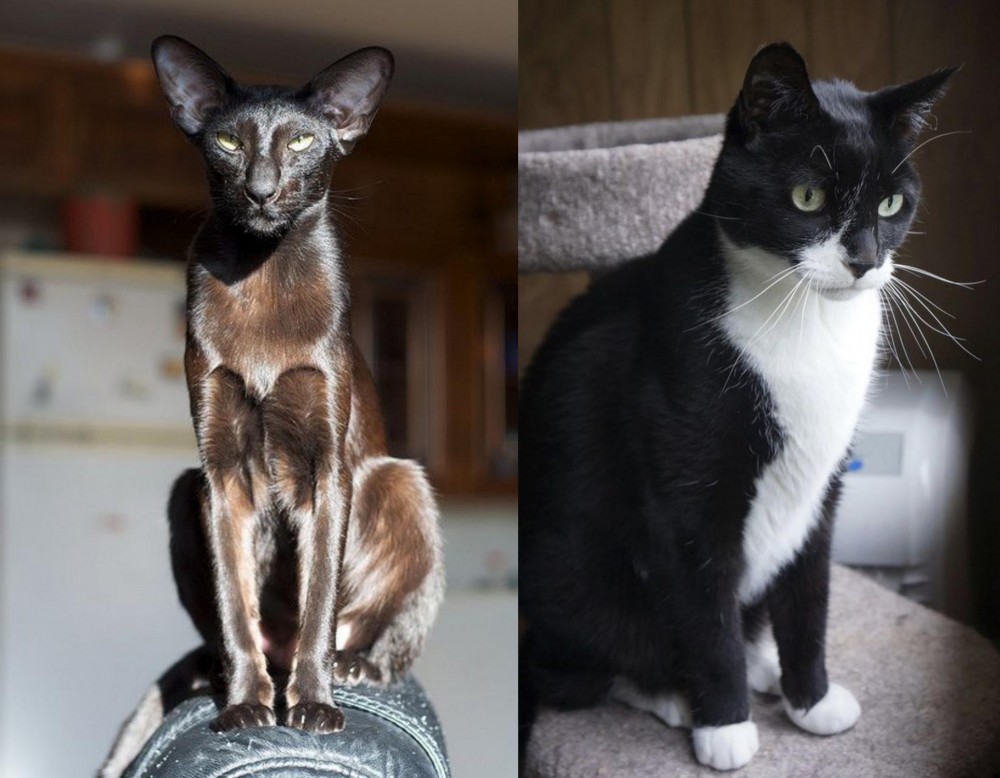 Oriental Shorthair is originated from United Kingdom but Tuxedo is originated from United States. Both Oriental Shorthair and Tuxedo are having almost same weight. Oriental Shorthair may live 5 years less than Tuxedo. Both Oriental Shorthair and Tuxedo has same litter size. Oriental Shorthair requires Low Maintenance. But Tuxedo requires Moderate Maintenance
Oriental Shorthair is originated from United Kingdom but Tuxedo is originated from United States. Both Oriental Shorthair and Tuxedo are having almost same weight. Oriental Shorthair may live 5 years less than Tuxedo. Both Oriental Shorthair and Tuxedo has same litter size. Oriental Shorthair requires Low Maintenance. But Tuxedo requires Moderate Maintenance
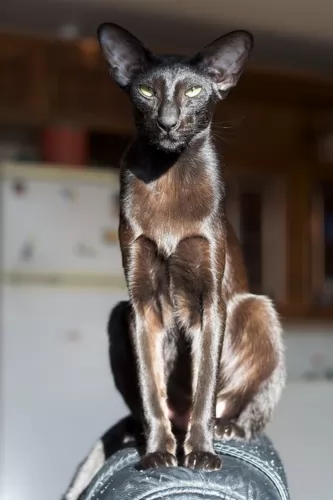 This domestic cat is also related to the Siamese Cat. Orientals come from a diverse group of cats, but they have their foundation in the Siamese breed.
This domestic cat is also related to the Siamese Cat. Orientals come from a diverse group of cats, but they have their foundation in the Siamese breed.
The cat was imported from Thailand to the UK during the 1800s. This particular cat was accepted as an actual breed in 1977. Quite a few of the top cat organizations recognize the Oriental Shorthair but as a Siamese.
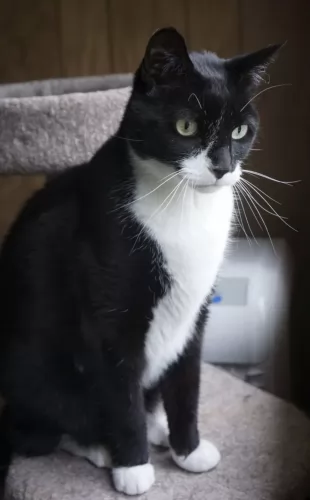 The Tuxedo cat is essentially a black and white cat and the name comes from him looking like he is dressed in a formal tuxedo.
The Tuxedo cat is essentially a black and white cat and the name comes from him looking like he is dressed in a formal tuxedo.
Tuxedos aren’t a new cat breed and they have been around for thousands of years. Tuxedo is merely describing the coat of the cat. So the Tuxedo cat isn’t a cat breed but rather a pattern color. A Persian cat as an example, can be a tuxedo cat because of its coat.
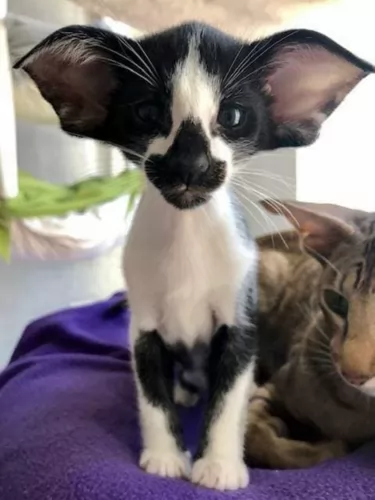 The Oriental Shorthair has a longish head with a slender neck and large ears. The legs are long and slender. The medium-sized cat weighs in the region of 3 – 5kg.
The Oriental Shorthair has a longish head with a slender neck and large ears. The legs are long and slender. The medium-sized cat weighs in the region of 3 – 5kg.
The eyes can be blue or green. Sometimes the cat will have one blue eye and one green eye. The coat is short and smooth and can be in a host of different colors.
The Oriental Shorthair is a curious, intelligent cat and they’re talkative too, loving to have conversations with their human family. They are cats that absolutely want to be part of the family. They don’t want to be left alone for too long either and get on well with children and pets in the home.
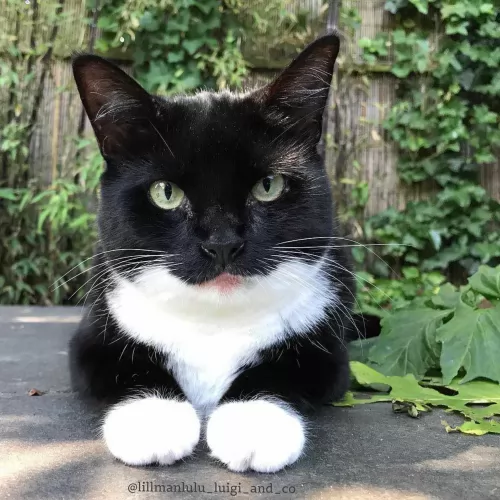 A tuxedo cat has distinct coat colors. Their bicolor coats are soft and sleek and sometimes the colors aren't limited to just black and white but they can be orange, gray or tortoiseshell.
A tuxedo cat has distinct coat colors. Their bicolor coats are soft and sleek and sometimes the colors aren't limited to just black and white but they can be orange, gray or tortoiseshell.
Because Tuxedo cats aren’t a breed, nothing is really set in stone with them and their size ranges. This means he can weigh between 3 and 7kg or 8 or even 9kg. The eyes of the Tuxedo cat are nearly always green.
The Tuxedo cat’s personality is varied as well because it can be any breed of cat. There are some Tuxedo cat owners who will say that their cats have a definite Tuxedo personality, but there is no research that indicates that these cats have a particular personality.
They are all different. Most Tuxedo cats however are friendly, social, loving, and lively.
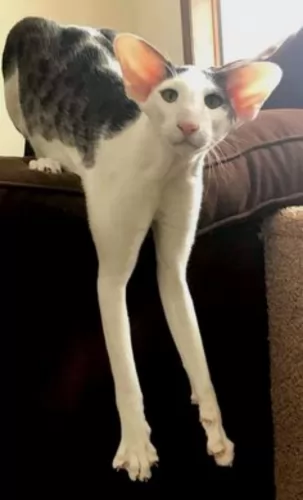 The Oriental Shorthair promises to be an active companion in your life. It’s a cat that likes to involve itself with all the activities that its human family takes part in.
The Oriental Shorthair promises to be an active companion in your life. It’s a cat that likes to involve itself with all the activities that its human family takes part in.
He is a great entertainer too, and he loves all the attention he gets, thriving on being the center of attention.
The Oriental Shorthair cat is slightly more quieter than the Siamese cat but he will still want to tell you what he’s doing and what he wants.
It’s a cat that has many many colors and shades, but the color extends to the cat’s personality. It has a colorful, interesting, inquisitive personality.
The cat is lively and social and will fit in best with a lively, active home where there are also animals to keep him company. By having this loving cat in your home and life, you bring in joy and happiness.
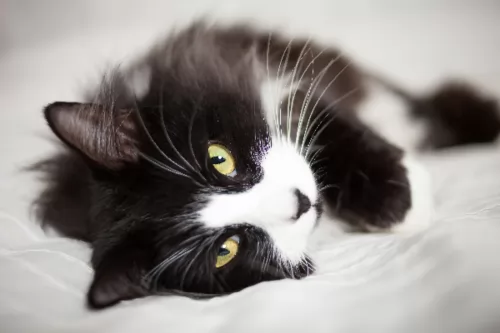 The tuxedo cat is such a sport - always up for fun and games. Cats like the tuxedo are always a great choice of pet.
The tuxedo cat is such a sport - always up for fun and games. Cats like the tuxedo are always a great choice of pet.
Cats like the tuxedo are also low maintenance and he is clever enough to even have a bit of training.
The tuxedo cat, even though he likes the outdoors, can also be an apartment cat. He also gets on well with children and other pets in the home. Having a tuxedo in the home is guaranteed to fill your home with joy, and you owe it to him to provide him with lots of love and attention.
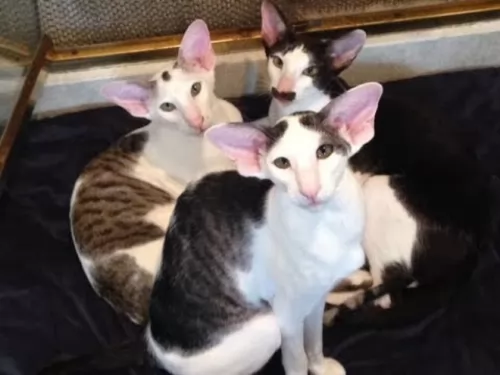 Oriental Shorthairs share some of the same health issues as Siamese cats. Make sure, if your cat shows signs of illness that you have pinpointed a vet in your area.
Oriental Shorthairs share some of the same health issues as Siamese cats. Make sure, if your cat shows signs of illness that you have pinpointed a vet in your area.
Things such as asthma, bronchial disease, lymphoma, neurological disorders, and gastrointestinal problems will need to be seen by the vet.
Think about having your cat spayed or neutered. Not only is this surgery important for preventing unwanted pregnancies, but it can also remove the urge for the cat to roam. The procedure has health benefits for your cat too.
Ensure that your Oriental shorthair has his vaccines up to date. These vaccines are important for preventing your cat from getting some deadly feline diseases. Kittens usually get the first vaccines between the ages of 6 and 8 weeks. Certainly, if you decide to go on holiday and you want to board your cat, the boarding kennels will require that the vet’s card and vaccines are 100% up to date.
Prevent parasites by using a treatment subscribed for your pet by the vet.
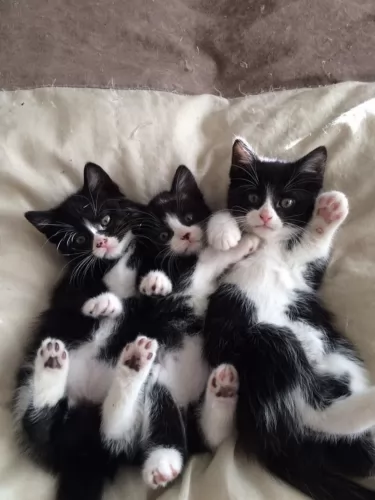 The Tuxedo cat has no real health concerns and that is just another reason why they make such popular pets. There are, however, always health issues that a cat can succumb to.
The Tuxedo cat has no real health concerns and that is just another reason why they make such popular pets. There are, however, always health issues that a cat can succumb to.
This is caused by kidney disease. It is one of the leading causes of death in older cats, and causes can include age but also genetics.
Your cat can show a number of symptoms such as excessive urination, nausea, terrible thirst, dehydration, constipation, and loss of appetite.
There is no cure for feline kidney disease but it can be treated and managed, and that is why you will need to see the vet.
This is the dreaded feline distemper for which your cat will need to be vaccinated against. It is a highly contagious viral disease, with kittens being more at risk.
After contracting the disease. It can spread through bodily fluids as well as fleas and is mostly transmitted by contaminated food and water bowls as well as litter trays.
The disease affects the intestinal tract of the cat and attacks the immune systems. Your cat will be vomiting, have diarrhea and anemia and he will have loss of appetite, lethargy and be totally and utterly down in the dumps.
Cancer is common in cats of all ages. When you brush your Tuxedo, be aware of any unusual lumps. Lymphoma is a common cancer in cats.
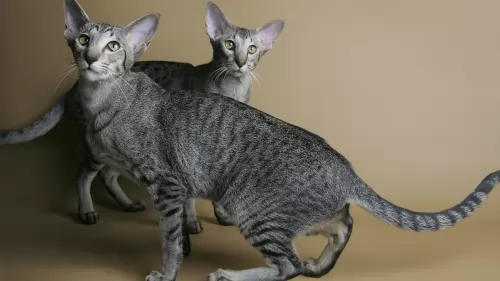 The short glossy coat doesn't shed much and the cat is considered low maintenance. A brush once a week will be adequate. A wipe down with a damp cloth will keep the cat dust-free and shiny.
The short glossy coat doesn't shed much and the cat is considered low maintenance. A brush once a week will be adequate. A wipe down with a damp cloth will keep the cat dust-free and shiny.
Just doing this for your cat is good for the cat’s morale as he thrives on attention, relishing the human interaction he gets during grooming.
Trim his nails, particularly if he is an indoor cat.
Keep your Oriental Shorthair lean and mean by not overfeeding him. The cat’s build is designed for slimness and he won't do at all well with the extra weight. The extra weight can lead to lots of health problems, one of which is diabetes.
If in any doubt as to how much to feed your cat, consult your vet about portion sizes. There are excellent commercially manufactured cat foods on the market, and the manufacturers know that cats are carnivores and that the best cat goods are high in protein.
Avoid giving your cat any kind of human food. Never leave him without a constant supply of fresh, cool water.
Provide your cat with a litter box and keep the box free of cat droppings. You can invest in small rakes from the pet shop and they make it easy to rake up the feces and dispose of them. Change the litter regularly too.
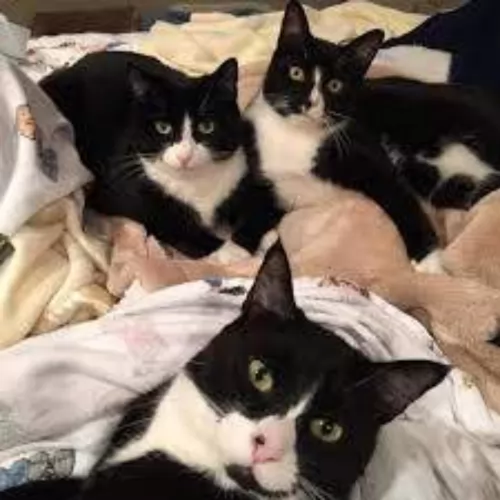 The Tuxedo cat is cared for in much the same way that you would care for any other cat really.
The Tuxedo cat is cared for in much the same way that you would care for any other cat really.
The coat of the Tuxedo requires no special treatment as the coat isn’t really ever long. Simply brush it at least once a week to reduce matting and dust collecting on the coat. You want to keep it shiny and sleek.
Provide a scratching post and a climbing tree as these are both taking care of natural instincts of a cat – to scratch and to leap.
Ensure your pet isn’t bored. Provide him with plenty of opportunities to have fun and to play. Provide him with interactive toys to keep him amused.
Cats like to sleep quite a bit so provide him with a nice soft bed in a quiet area.
If your Tuxedo is an indoor cat, he will need a litter box in a quiet area. Be sure to clean the litter box of feces every single day. Make sure that the actual litter is kept clean and tidy.
Your Tuxedo cat should be fed the same diet as any other cat. This is because every cat there is is a carnivore and their diet has to be made up of meat. A wet food diet or a dry food diet is available but make sure it is always of the highest quality. This will ensure your pet gets all the nutrients to ensure good health. Discuss your cat's s dietary needs with your vet if you are in any doubt.